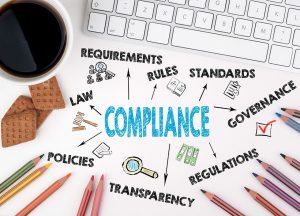Published Articles
Susan J. Schniepp, distinguished fellow at Regulatory Compliance Associates, addresses the difference between regulatory compliance and real compliance.
Q: I just attended a meeting where someone talked about the concept of real compliance. Can you explain what they were referring to?
A: This is a great question because I believe there is a difference between regulatory compliance and real compliance. Naturally, let’s start with what we mean by regulatory compliance.
cGMP
The current good manufacturing practice (CGMP) regulations for drugs contain minimum requirements for the methods, facilities, and controls. Subsequently, cGMP is also critically important in the manufacturing, processing, labeling, and packaging of drug products.
Regulatory Compliance
In the United States, some of the laws are delineated in section 501(a)(2)(B) of the Food, Drug, and Cosmetic Act, which states:
“A drug shall be deemed to be adulterated if the methods used in, or the facilities or controls used for, its manufacture, processing, packaging, or holding do not conform to or are not operated or administered in conformity with current good manufacturing practice to assure that such drug meets the requirements of this [Act] as to safety and has the identity and strength, and meets the quality and purity characteristics, which it purports or is represented to possess” .

US Title 21 Code of Federal Regulations (CFR) Part 211 establishes the regulations based on the law. For instance, the regulations contained in 21 CFR Part 211 do not tell you how to specifically meet these regulatory requirements.
FDA Inspection
Instead, the law tells you what is expected of your quality management system (QMS) in order to achieve compliance to the regulations. The goal of regulatory compliance is to both satisfy the regulations and achieve a satisfactory outcome during an FDA inspection.
Compliance Regulations
Real compliance is how a company interprets compliance regulations and regulatory expectations, and apply them to their specific operations. Real compliance is rooted in a commitment to quality at all levels of an organization.
A real compliance approach takes a high-level view of quality and allows the organization to put in controls that help prevent deviations from occurring. It also provides a better understanding of the impact of regulatory and compliance deviations when they occur during manufacturing.
Regulatory Risk
Organizations that adopt a quality-based philosophy (real compliance) minimize the regulatory risk when deviations of a serious nature occur. Real compliance is the practical application of a quality management system and how it is integrated into modern manufacturing.
Manufacturing Processes
The quality commitment of real compliance lies within manufacturing processes. The goal is to achieve a sustainable state of control based on certified regulatory compliance. This includes at the manufacturing facility based on scientific principles, best practices, and continuous improvement efforts. The best way to explain the difference between regulatory compliance and real compliance is to perform a thorough regulatory risk management exercise.
21 CFR Part 11
The regulations clearly require companies to have written procedures that are in the form of standard operating procedures (SOPs). The common language used in 21 CFR Part 211 to indicate SOPs are required can be exemplified by 21 CFR 211.22
“Responsibilities of quality control unit”, which states “(d) The responsibilities and procedures applicable to the quality control unit shall be in writing; such written procedures shall be followed” (2).
This type of wording can be found is sections of 21 CFR 211 governing personnel qualifications, building and facilities, equipment, production and process control, labeling issuance, warehousing procedures, etc. The regulatory requirement is met by having SOPs, but real compliance is met having SOPs that reflect your operations during a regulatory audit.
Standard Operating Procedure (SOP)
For example, data compliance regulations change from insourcing and outsourcing. If you outsource product testing you would not need an SOP on how to investigate out of specification (OOS) results because you are not performing that activity. Instead, you might replace it with an SOP describing how you work with your contract test laboratory when they are investigating an OOS result associated with your product.
Complaint Management
Another example between regulatory compliance and real compliance is just having a complaint department vs. handling customer complaints correctly. Complaint handling involves employees who understand and trained to manage customer complaints.
Design for Manufacturing
Further, training should consider design for manufacturing and how employees are empowered to resolve each customer complaint. Another difference between regulatory compliance and real compliance is having an organization chart that separates the quality & operations team. As an illustration, have your organization chart demonstrate where quality has the responsibility and authority to operate independently.
Compliance Example
Here’s a more practical example of regulatory compliance vs. real compliance. US 21 CFR 211.25(a) requires:
“Each person engaged in the manufacture, processing, packing, or holding of a drug product shall have education, training, and experience or any combination thereof, to enable that person to perform the assigned functions”.
A regulatory compliance approach would be to offer every employee annual GMP training and document their attendance. A real compliance approach would be to provide effective training to the employees by assessing their comprehension of the material and offering follow-up training as necessary.
Compliance Investigation
Another practical example of regulatory compliance vs. real compliance is examining how a company approaches investigations. A strictly regulatory compliance approach to an investigation results in a firm not determining the true root cause of an issue. Equally important, compliance investigation processes focus on the quality of the investigation instead of completing the investigation in a specific time frame.
Root Cause
Real compliance organizations focus on determining the true root cause(s) and using that information across their manufacturing facility to drive continuous improvements and prevent recurrence of the deviation that prompted the investigation. Taking a regulatory compliance only approach to operations may be less expensive in the short term.
Article details

BioPharm International
Volume 35, Number 10
Pages 54, 52
To begin the Regulatory Compliance Associates scoping process today, please enter your information in the blue form below and click the submit button at the bottom of the webpage. You may also email us at [email protected].
Connect with RCA Today
Contact us to learn more about our regulatory compliance experts and how they can help



















